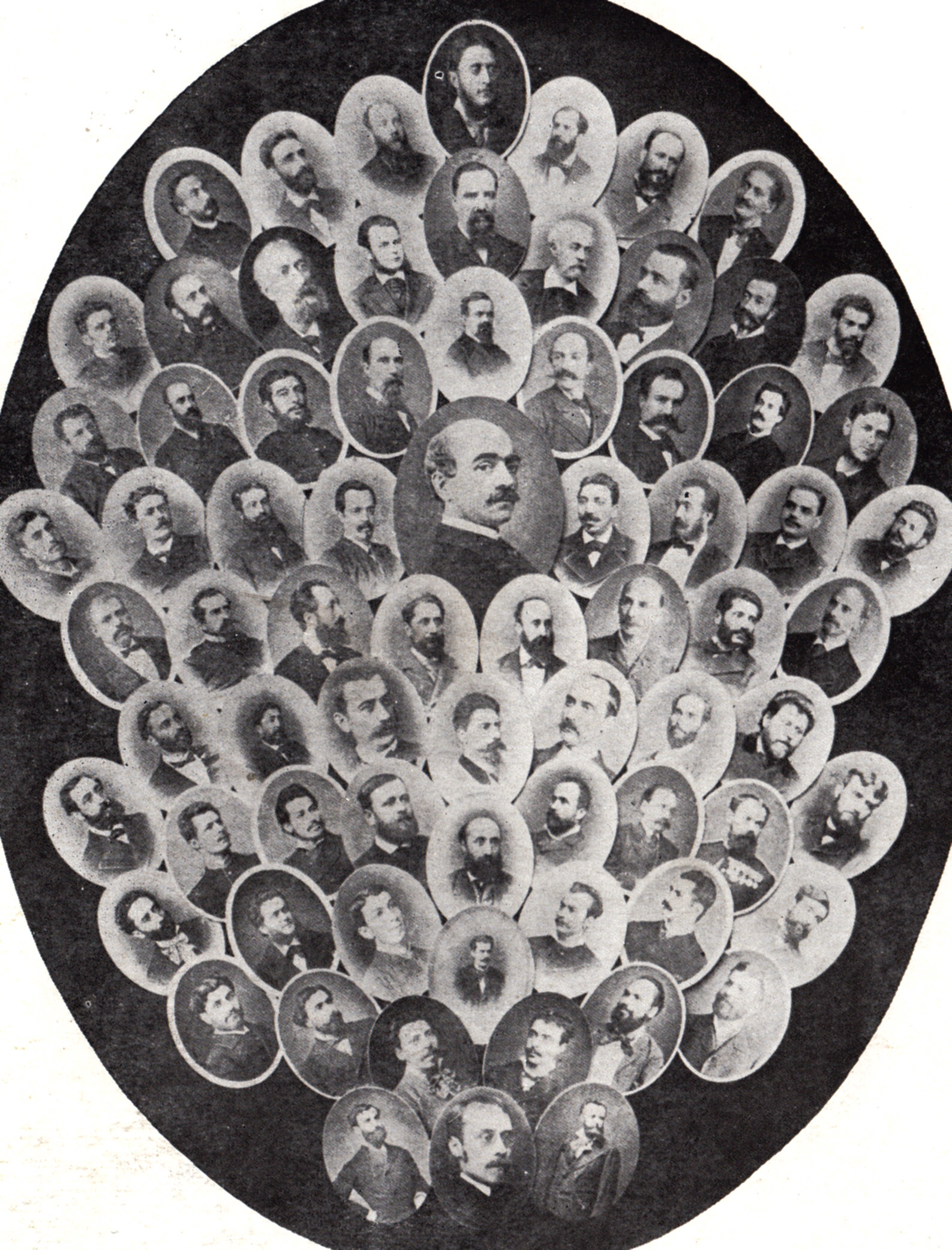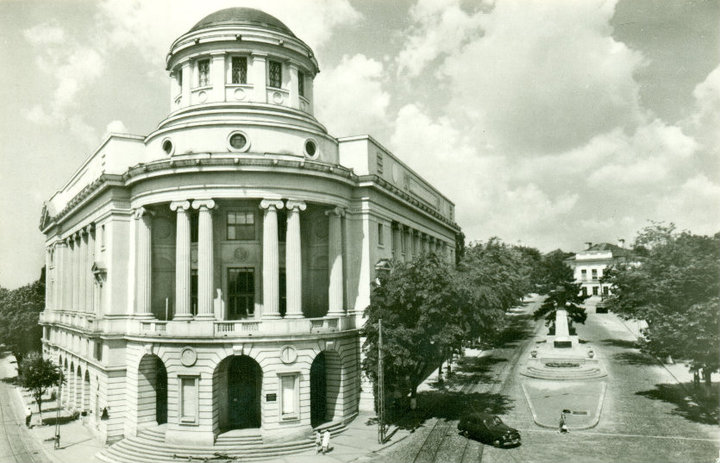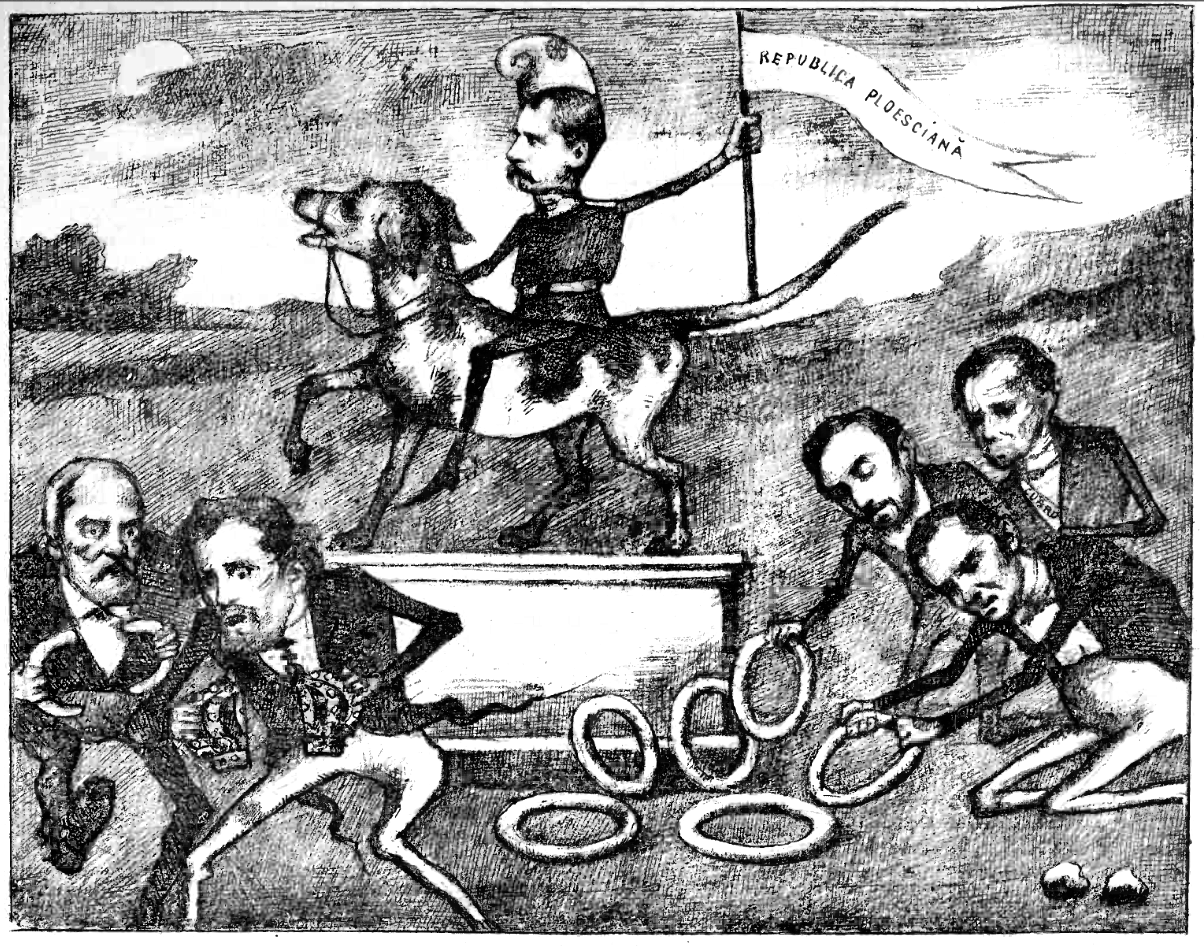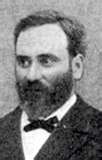|
Alexandru Lambrior
Alexandru Lambrior (January 12, 1845 – September 20, 1883) was a Romanian philologist and folklorist. A native of Fălticeni in Moldavia, he studied at Iași University and, after beginning a career as a teacher, in Paris. He resumed teaching in 1878, but died of tuberculosis five years later. A pioneer of linguistics in his country, he revered the Romanian of the old medieval chronicles, deploring what he saw as the corrosive effects of neologisms. Lambrior compiled a successful anthology of texts covering some three centuries, and his work on early literature existed alongside an interest in folklore, about which he also proposed original theories. Biography Born at Fălticeni in the Principality of Moldavia, his father was Dimitrachi Lambrior; a poor child who was adopted, Dimitrachi's origins are unknown, and his son would later strive to find them out. His mother Marghiolița was the daughter of a low-ranking ''boyar'': her father Vasile Cumpătă was '' vistiernic'' (treas ... [...More Info...] [...Related Items...] OR: [Wikipedia] [Google] [Baidu] |
Fălticeni
Fălticeni (; ''german: Foltischeni; hu, Falticsén;'' he, פלטיצ'ן yi, פאלטישאן) is a town in Suceava County, northeastern Romania. It is situated in the historical region of Western Moldavia. Fălticeni is the second largest urban settlement in the county, with a population of 24,619 inhabitants, according to the 2011 census. It was declared a municipality in 1995, along with two other cities in Suceava County: Rădăuți and Câmpulung Moldovenesc. Fălticeni covers an area of , of which 25% are orchards and lakes, and it administers two villages: Șoldănești and Țarna Mare. It was the capital of former Baia County (1929–1950). The town is known for the high number of Romanian writers, artists, and scientists who were born, lived, studied, or have created here. Geography Fălticeni is located in the southern part of Suceava County, 25 km away from Suceava, the capital of the county. The European route E85 crosses the city. Fălticeni is connected to ... [...More Info...] [...Related Items...] OR: [Wikipedia] [Google] [Baidu] |
Junimea
''Junimea'' was a Romanian literary society founded in Iași in 1863, through the initiative of several foreign-educated personalities led by Titu Maiorescu, Petre P. Carp, Vasile Pogor, Theodor Rosetti and Iacob Negruzzi. The foremost personality and mentor of the society was Maiorescu, who, through the means of scientific papers and essays, helped establish the basis of the modern Romanian culture. Junimea was the most influential intellectual and political association from Romania in the 19th century. Beginnings In 1863, four years after the union of Moldavia and Wallachia (''see: United Principalities''), and after the moving of the capital to Bucharest, five enthusiastic young people who had just returned from their studies abroad created in Iaşi a society which wanted to stimulate the cultural life in the city. They chose the name "''Junimea''", a slightly antiquated Romanian word for "Youth". It is notable that four of the founders were part of the Romanian elite, the ... [...More Info...] [...Related Items...] OR: [Wikipedia] [Google] [Baidu] |
Mihail Eminescu
Mihai Eminescu (; born Mihail Eminovici; 15 January 1850 – 15 June 1889) was a Romanian Romantic poet from Moldavia, novelist, and journalist, generally regarded as the most famous and influential Romanian poet. Eminescu was an active member of the Junimea literary society and worked as an editor for the newspaper ''Timpul'' ("The Time"), the official newspaper of the Conservative Party (1880–1918). His poetry was first published when he was 16 and he went to Vienna, Austria to study when he was 19. The poet's manuscripts, containing 46 volumes and approximately 14,000 pages, were offered by Titu Maiorescu as a gift to the Romanian Academy during the meeting that was held on 25 January 1902. Notable works include '' Luceafărul'' (''The Vesper/The Evening Star/The Lucifer/The Daystar''), ''Odă în metru antic'' (''Ode in Ancient Meter''), and the five ''Letters'' (''Epistles/Satires''). In his poems, he frequently used metaphysical, mythological and historical subjects. H ... [...More Info...] [...Related Items...] OR: [Wikipedia] [Google] [Baidu] |
Timpul
''Timpul'' (Romanian for "The Time") is a literary magazine published in Romania Romania ( ; ro, România ) is a country located at the crossroads of Central, Eastern, and Southeastern Europe. It borders Bulgaria to the south, Ukraine to the north, Hungary to the west, Serbia to the southwest, Moldova to the east, and .... Originally a political newspaper, it was the official platform of the Conservative Party between 1876 and 1914. The publication is still active (2018) and published as a monthly in Iași, with print and online editions. References Newspapers published in Romania Conservative Party (Romania, 1880–1918) Mass media in Iași {{Romania-newspaper-stub ... [...More Info...] [...Related Items...] OR: [Wikipedia] [Google] [Baidu] |
Conservative Party (Romania, 1880–1918)
The Conservative Party ( ro, Partidul Conservator) was between 1880 and 1918 one of Romania's two most important parties, the other one being the Liberal Party.Scurtu 1982, p.41''n''; for the founding of the party, this source gives February 1880, does not specify day of month. The party was the party of government for a total of 14 years, more than a third of its existence. It was founded on 3 February 1880 in Bucharest, although the doctrines and various groups of conservatives had already existed for some time. Precursors to the party had included the political grouping "Juna Dreaptă" (November 1868) and the newspaper ''Timpul'' (founded March 1876). The party relied on the support of the great landowners, the bourgeoisie, and some intellectuals. Their economic policy encouraged light industry and crafts but did not oppose investments in heavy industry. The 1907 Romanian Peasants' Revolt showed that some reforms needed to be made in the Romanian social and political scene. ... [...More Info...] [...Related Items...] OR: [Wikipedia] [Google] [Baidu] |
Gheorghe Chițu
Gheorghe Chițu (first name also George or Giorgiu, last name also Chițiu, Chitzu, Kițu or Kitzu; Francized as ''Georges Kitzou''"Roumanie", in ''La Justice'', 7 July 1884, p. 2 or ''Quitzou'';Pecican, p. 161 24 August 1828 – 27 October 1897) was a Wallachian, later Romanian lawyer, politician, and man of letters, whose activities were mostly centered on the region of Oltenia. The recipient of a classical education, which compensated for his middle-class background and allowed him to study at the University of Vienna, he was also deeply involved in the Wallachian Revolution of 1848 as an early adherent of "Red" liberalism. He became a propagandist and organizer for the National Party, founding ''Vocea Oltului'' gazette in 1857. Chițu was confirmed as the United Principalities' first-ever elected provincial mayor, at Craiova, where he also worked as a lawyer and prosecutor. His political radicalism and his participation in the Romanian Freemasonry were nuanced by his defense ... [...More Info...] [...Related Items...] OR: [Wikipedia] [Google] [Baidu] |
National Liberal Party (Romania, 1875)
The National Liberal Party ( ro, Partidul Național Liberal, PNL) was the first organised political party in Romania, a major force in the country's politics from its foundation in 1875 to World War II. Established in order to represent the interests of the nascent local bourgeoisie, until World War I it contested power with the Conservative Party, supported primarily by wealthy landowners, effectively creating a two-party system in a political system which severely limited the representation of the peasant majority through census suffrage. Unlike its major opponent, the PNL managed to preserve its prominence after the implementation of universal male suffrage, playing an important role in shaping the institutional framework of ''Greater Romania'' during the 1920s. History Dominated throughout its existence by the Brătianu family, the party was periodically affected by strong factionalism. Among the many splits during the party's early history a notable one was that led ... [...More Info...] [...Related Items...] OR: [Wikipedia] [Google] [Baidu] |
Société De Linguistique De Paris
The Société de Linguistique de Paris (established 1864) is the editing body of the ''BSL'' (''Bulletin de la Société de Linguistique'') journal. Members of the society have included such well-known French linguists as Bréal, Saussure, Meillet, and Benveniste The Spanish Benveniste family is an old, noble, wealthy, and scholarly Jewish family of Narbonne, France and northern Spain established in the 11th century. The family was present in the 11th to the 15th centuries in Hachmei Provence, France, Barc .... In addition to its monthly meetings, the group holds a one-day conference each January dedicated to a particular topic. In 1997, it organised the '' Congrès International des Linguistes'' in Paris. References External links *http://www.slp-paris.com/ Linguistic societies Organizations based in Paris {{ling-org-stub ... [...More Info...] [...Related Items...] OR: [Wikipedia] [Google] [Baidu] |
École Pratique Des Hautes études
The École pratique des hautes études (), abbreviated EPHE, is a Grand Établissement in Paris, France. It is highly selective, and counted among France's most prestigious research and higher education institutions. It is a constituent college of the elite Université PSL (together with ENS Ulm, Paris Dauphine or Ecole des Mines). Its degrees in religious studies and in history count among the best in the world. Closely linked to École française d'Extrême-Orient and Institut français du Proche-Orient, EPHE has formed continuously world-class experts in Asian and Islamic studies and among them investment bankers, diplomat and military officers specialized in these areas. Particularly, leading researchers in military strategy have taught in EPHE for more than a century, such as, by example, Hervé Coutau-Bégarie. Moreover, famous researchers in natural sciences (especially neurosciences and chemistry) teach and taught in EPHE (among them Jean Baptiste Charcot and Marcel ... [...More Info...] [...Related Items...] OR: [Wikipedia] [Google] [Baidu] |
Arsène Darmesteter
Arsène Darmesteter (5 January 1846, Château-Salins, Moselle16 November 1888, Paris) was a distinguished French philologist and man of letters. Biography He studied under Gaston Paris at the École pratique des hautes études, and became professor of Old French language and literature at the Sorbonne, where he met his wife, the painter Héléna Hartog. His ''Life of Words'' appeared in English in 1888. He also collaborated with Adolphe Hatzfeld in a ''Dictionnaire général de la langue française'' (2 vols., 1895-1900). Among his most important work was the elucidation of Old French by means of the many glosses in the medieval writings of Rashi and other French Jews. His scattered papers on Romance and Jewish philology were collected by James Darmesteter James Darmesteter (28 March 184919 October 1894) was a French author, orientalist, and antiquarian. Biography He was born of Jewish parents at Château-Salins, in Lorraine. The family name had originated in their earlier h ... [...More Info...] [...Related Items...] OR: [Wikipedia] [Google] [Baidu] |
Gaston Paris
Bruno Paulin Gaston Paris (; 9 August 1839 – 5 March 1903) was a French literary historian, philologist, and scholar specialized in Romance studies and medieval French literature. He was nominated for the Nobel Prize in Literature in 1901, 1902, and 1903. Biography Gaston Paris was born under the July Monarchy at Avenay (Marne), the son of Paulin Paris (1800–1881), an important French scholar of medieval French literature. In his childhood, Gaston learned to appreciate Old French romances as poems and stories, and this early impulse for the study of Romance literature was placed on a solid basis by courses of study at the University of Bonn (1856), in the German Confederation, and at the École Nationale des Chartes, at the time under the rule of the Second French Empire. Paris taught French grammar in a private school, later succeeding his father as professor of medieval French literature at the Collège de France in 1872; in 1876 he was admitted to the Académie de ... [...More Info...] [...Related Items...] OR: [Wikipedia] [Google] [Baidu] |
Michel Bréal
Michel Jules Alfred Bréal (; 26 March 183225 November 1915), French philologist, was born at Landau in Rhenish Palatinate. He is often identified as a founder of modern semantics. Life and career Michel Bréal was born at Landau in Germany of French-Jewish parents.Michel Bréal (1832–1915), A forgotten precursor of enunciation and subjectivity Arnaud Fournet After studying at Wissembourg, Metz and Paris, he entered the École Normale Supérieure in 1852. In 1857 he went to Berlin, where he studied Sanskrit under Franz Bopp and Albrecht Weber. On his return to France he obtained an appointment in the department of oriental manuscripts at the Bibliothèque Impériale. In 1864 he became professor of comparative grammar at the Collège de France, in 1875 member of the Académie des Inscriptions et Belles-lettres, in 1879 ''inspecteur général'' for higher education until the abolition of the office in 1888. In 1890 he was made commander of the Legion of Honour. He resigned ... [...More Info...] [...Related Items...] OR: [Wikipedia] [Google] [Baidu] |





